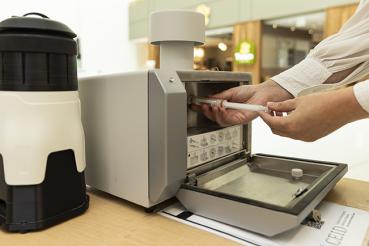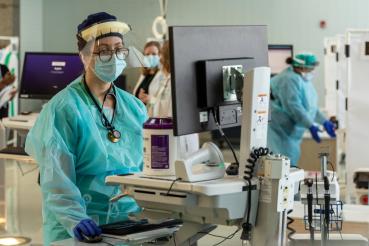Last week, monkeypox was declared a public health emergency in Illinois and the country as the U.S. surpassed all other nations for current cases.
Given this news, you may be wondering if we are headed for another pandemic like COVID-19. We asked Mary Hayden, MD, chief of infectious diseases at Rush University Medical Center, to offer her perspective.
Could monkeypox be the next COVID-19?
“The short answer is no,” Hayden says. “The virus that causes monkeypox is much harder to spread than the virus that causes COVID-19.”
The monkeypox virus is typically transmitted through skin-to-skin contact with the rash of an infected person or by close contact with infected body fluids, Hayden says. Less often, it is spread through droplets that are inhaled or that enter the eyes or mouth. It may also be passed through contaminated clothing or bedding, according to the Centers for Disease Control and Prevention.
What are the symptoms of monkeypox?
According to Hayden and CDC, early signs of monkeypox include:
- Fever
- Headache
- Muscle aches
- Chills
- Fatigue
- Swollen lymph nodes
- A painful rash
The rash may show up on the genitals, face, chest, hands, feet or other parts of the body, Hayden says. “Rashes on the genitals might be confused with more common sexually transmitted infections such as herpes or syphilis, although monkeypox is not considered an STI,” she says. “The rash might start out as small, flat spots and then develop into bumps or blisters similar to chickenpox or pimples.”
During the next several weeks, the sores will eventually crust over and form scabs. People with monkeypox are contagious until the scabs fall off and healthy skin can be seen, Hayden adds.
Can anyone get monkeypox?
Although it is possible for anyone to get monkeypox, the number of cases in women and children remains small. “Nearly all cases reported to date have been among men who have sex with men, and most transmission was thought to have occurred through intimate sexual contact,” Hayden says. “Having sex or other intimate contact like kissing or cuddling with multiple or anonymous partners increases your risk of exposure.”
How can I protect myself against monkeypox?
To reduce your risk, Hayden recommends the following practices:
- Avoid close skin-to-skin contact with anyone who has a rash that looks like monkeypox or who otherwise appears ill.
- Do not share food, drinks or eating utensils with anyone with monkeypox.
- Do not handle or touch clothing, bedding or towels of anyone with monkeypox.
- Wash your hands often with soap and water or an alcohol-based hand sanitizer.
“If you have an unexplained fever, rash or other signs of monkeypox, call your primary care provider or go to a health clinic to get tested,” Hayden says. “To slow the spread, try to cover any rash or sores on your skin with clothing or Band-Aids, wear a mask and avoid close or intimate contact with others until you get your test results.”
Rush is partnering with the Chicago Department of Public Health to offer the monkeypox vaccine for people who meet certain criteria. You can also receive the vaccine after exposure to someone with confirmed monkeypox to reduce your risk for developing the disease.
To get tested for monkeypox or to find out if you are eligible for the vaccine, call Rush at (888) 352-7874 (RUSH).




